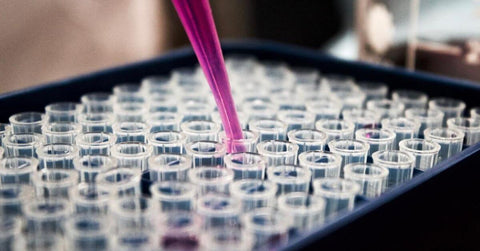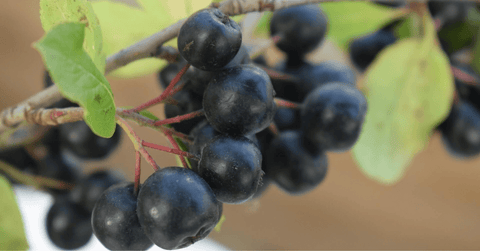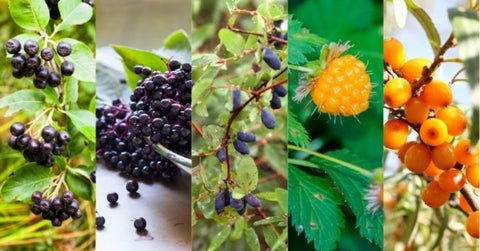Of the natural products tested in the laboratory, the NFC juice of the aronia berry melanocarpa proved to be surprisingly antiviral.
In-vitro laboratory tests have revealed that aronia berry juice is able to quickly kill off Coronaviruses and flu viruses and is therefore ideal for the prevention of such viral infections. This was the finding of researchers in a laboratory study conducted by the Institute of Molecular Virology at the Ulm University Medical Centre, the Laboratory Prof. Dr. G. Enders MVZ in Stuttgart and CogniVerde GmbH in Groß-Umstadt which specialises in natural healing product development. The study that included the aronia juice which was the most effective also tested pomegranate juice and green tea.
“The proven strong antiviral properties of aronia juice are, indeed, highly promising!” said Prof. Dr. med. Dr. rer. nat. Bernhard Uehleke. The doctor and scientist was a member of the \”Commission E\” for the assessment of phytopharmaceuticals at the Federal Institute for Drugs and Medical Devices and board member of the Association of Phytotherapy (phytomedicine) and the BerlinBrandenburg Doctors’ Association for Naturopathic Treatments. Uehleke has been familiar with the aronia berry as a healthy food due to its antioxidative properties and ability to strengthen blood vessels for already many years. Since the beginning of the year the professor has now been calling for certain plants to be investigated for their ability to help prevent SARS-CoV-2 – firstly in laboratory tests and then in clinical studies (on humans).

With its antiviral and viricidal properties shown in in vitro tests, Uehleke believes in a plausible use of aronia berry juice. Aronia juice may be able to inactivate the virus and prevent the docking process at the contact points where the virus tries to penetrate the somatic cells particularly in the oropharyngeal area. For such a local effect he recommends the following: “The juice needs to be thoroughly rinsed around the entire oral cavity and gargled as far back in the throat as possible. The juice should then be drunk in as small as possible sips. The gargling, rinsing and swallowing covers these possible contact points which the virus encounters and leaves them unchanged for a period of time which is still to be examined further,” says the expert.
Uehleke estimates that this local antiviral effect could last “a good one to two hours” but at least as long as the slightly “furry” astringent sensation on the oral mucosa lasts. After the current study was conducted in laboratory conditions in a way which was as practice-orientated as possible (the viruses were confronted with the juice in a similar concentration as if someone were rinsing their mouth or gargling) – but not direct on test persons – statements concerning protection against infections in humans were previously only possible based on plausibility considerations. In principle, this procedure could be applied several times a day for example before or after shopping, on a bus journey or at the workplace. High risk groups such as nursery workers, teachers or health professionals could use aronia juice more frequently as the juice is well tolerated.

Uehleke recommends rinsing the mouth and gargling with 20 millilitres of aronia juice (roughly one mouthful) for one minute immediately after getting up in the mornings and before going to bed. It is also important to swallow the juice to cover the deeper-lying areas of the throat which aren’t exposed to the juice during gargling. In the case of people who are already infected, swallowing aronia juice can also attack viruses which have been swallowed with saliva and are already in the stomach if the gastric acid is not sufficient for this. Uehleke highlights that the intestine-linked immune system becomes active against viruses which have been killed off that end up here.
According to Professor Uehleke, a further important aspect is that persons who take gastric acid blockers (so-called PPI medicines) may have a low acidity level in the stomach which could lead to a greater number of still active viruses ending up in the intestine where they could cause an infection in the gastrointestinal tract, possibly even a severe case if the virus level is high. For this reason, Uehleke recommends that people who take such medication or those who have symptoms of a gastrointestinal infection, frequently drink aronia juice to ensure a higher concentration of the juice in the intestine.
Further studies needed for verification of findings
Uehleke calls for virologists worldwide to confirm this first in vitro study and start suitable studies on humans to measure the effect of this additional possibility in preventing the spread of the SARS-CoV-2 virus. The professor is planning to initiate an observation study with test persons in order to evaluate the significnace of the findings of the laboratory study with regard to the current pandemic. The natural medicine expert believes that if there is a more widespread use of this juice in the current situation, a further contribution will have been made to other preventative measures which could lead to an earlier lifting of restrictions in social and financial life.
Link to original publication:
https://www.biorxiv.org/content/10.1101/2020.10.30.360545v1
Contact for specialist medical queries:
Prof. Dr. med. Dr. Bernhard Uehleke
Aroniabeere e.V. association:
PR
Gunther Schnatmann
DIF Deutsches Institut für Forschungskommunikation GmbH
presse@aroniabeere.de



